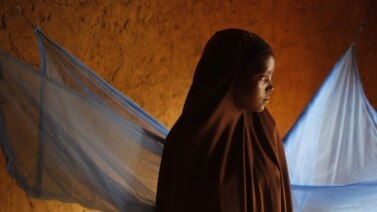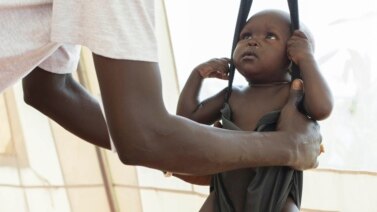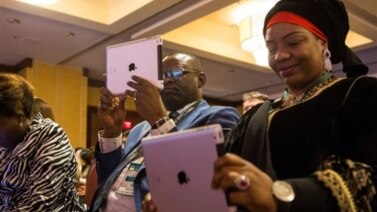
A Christian aid group says problems like hunger, malnutrition and poverty cannot be solved until and unless women are treated as well as men. The group Bread for the World released a report on hunger this week. It says the number and percentage of hungry people worldwide is dropping. But it says the drop could be greater if governments and societies worked to make sure women had rights and power equal to those that men have.
Fouzia Dashir of Kenya created the Northern Organization of Social Empowerment. She works with women farmers, showing them how to earn money by growing cash crops. She told VOA that women should not hope that men will give them power -- they should take it.
“Women should not wait for men. Women should not wait for any institution. It’s about them -- they should wake up, they should get out of their comfort zone, work together and, and do so much, you know, for themselves.”
Gary Barker leads a non-governmental organization that seeks to involve men in fighting for the equal treatment of women and ending violence against women. Mr. Barker says improving the lives of women will not hurt men. In fact, he says, just the opposite will happen.
“We use an expression off of the community level that ‘men of quality are not afraid of equality.’ It is really about changing what our relations as men and women are. And we should be happy and celebrate that as men, not be afraid of it.”
Gary Barker notes that many men use violence against women. But he says the majority of men do not. He says they should work to keep other men and boys from attacking women.
Asma Lateef works for Bread for the World. She says just 10 percent of agricultural development aid goes to women, yet 43 percent of all farmers are women.
Ms. Lateef says governments should help with child care and require equal pay for equal work. She says employers should pay women when they are sick, and not take money from their wages when they are unable to work for a short time.
“There are so many things that women do -- the unpaid care work, the household chores -- that are really not factored into programs. So women are in, in the end doing twice as much work.”
Bread for the World says men should help women with household duties, sharing some of the heavy burden women now carry mostly on their own.
Mr. Barker says if men did more house work and caregiving, and women had more power, men and their families would be helped.
“You know, women’s income coming into the household is good for us as men, too. It frees the pressure on our backs to be sole providers. And I think we show the economic data that would say the US GDP would grow by 9 percent if women were in the paid workforce as much as men are.”
Bread for the World says girls should be permitted to attend school for as long as boys do. It notes studies show that when girls in Africa are able to complete their schooling, their families are less likely to live in poverty.
Worldwide, 800 women die giving birth every day and 39,000 young girls are married to older men each day. That is 14 million every year, or one in nine girls. The group says three-quarters of girls in Niger, two-thirds of girls in Bangladesh and half of the girls in India become what are known as “child brides.”
Bread for the World has been releasing reports on poverty and hunger for 20 years. The group plans to give its report to all 535 members of the United States Congress. This is the first time it has used one of its reports to strongly call for equal treatment of men and women.
The group notes that, for the first time in American history, 100 of the members of Congress are women. That is about the same rate as the rest of the world, where 22% of parliamentary seats are held by women.
I’m Christopher Cruise.
VOA’s Christopher Cruise reported, wrote read and produced this story for Learning English. George Grow and Hai Do edited the story.
Words from This Story
malnutrition – n. the unhealthy condition that results from not eating enough food or not eating enough healthy food; poor nutrition
equal – adj. the same in number, amount, degree, rank, or quality
cash crop – n. a crop that is grown to be sold rather than for use by the farmer
wage – n. an amount of money that a worker is paid based on the number of hours or days that are worked
access – n. a way of being able to use or get something
discrimination – n. the practice of unfairly treating a person or group of people differently from other people or groups of people
household – n. the people in a family or other group that are living together in one house; adj.of or relating to a house or to the people living in a house
property – n. something that is owned by a person or business
Now it’s your turn to use these Words from This Story. In the comments section below, write a sentence using one of these words and we will provide feedback on your use of vocabulary and grammar.



